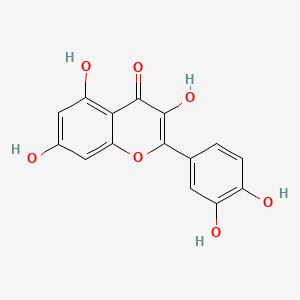quercetin
quercetin is a lipid of Polyketides (PK) class. Quercetin is associated with abnormalities such as Coronary heart disease, Myocardial Infarction, Cirrhosis, Coronary Arteriosclerosis and Vascular ring. The involved functions are known as Vasodilation, physiological aspects, Fermentation, Process and Ingredient. Quercetin often locates in Arterial system, Endothelium, Skin, Endothelium, Vascular and Tissue specimen. The associated genes with quercetin are P4HTM gene, SULT gene, UGT1A1 gene, ARHGAP26 gene and PLXNB1 gene. The related lipids are blood lipid, Promega, Steroids, Phosphatidylserines and Fatty Acids. The related experimental models are Knock-out, Mouse Model, Xenograft Model, Tissue Model and Cancer Model.
References related to genes published in J. Nutr.
| PMID | Journal | Published Date | Author | Title |
|---|---|---|---|---|
| 9482769 | J. Nutr. | 1998 | Conquer JA et al. | Supplementation with quercetin markedly increases plasma quercetin concentration without effect on selected risk factors for heart disease in healthy subjects. |
| 11238754 | J. Nutr. | 2001 | de Vries JH et al. | Red wine is a poor source of bioavailable flavonols in men. |
| 11584085 | J. Nutr. | 2001 | Walle T et al. | Carbon dioxide is the major metabolite of quercetin in humans. |
| 11435510 | J. Nutr. | 2001 | Sesink AL et al. | Quercetin glucuronides but not glucosides are present in human plasma after consumption of quercetin-3-glucoside or quercetin-4'-glucoside. |
| 11925453 | J. Nutr. | 2002 | Wolffram S et al. | Quercetin-3-glucoside is transported by the glucose carrier SGLT1 across the brush border membrane of rat small intestine. |
| 12221254 | J. Nutr. | 2002 | Arts IC et al. | Quercetin-3-glucoside is transported by the glucose carrier SGLT1 across the brush border membrane of rat small intestine. |
| 12888656 | J. Nutr. | 2003 | Mertens-Talcott SU et al. | Low concentrations of quercetin and ellagic acid synergistically influence proliferation, cytotoxicity and apoptosis in MOLT-4 human leukemia cells. |
| 11053503 | J. Nutr. | 2000 | Walle T et al. | Quercetin glucosides are completely hydrolyzed in ileostomy patients before absorption. |
| 10958819 | J. Nutr. | 2000 | Arai Y et al. | Dietary intakes of flavonols, flavones and isoflavones by Japanese women and the inverse correlation between quercetin intake and plasma LDL cholesterol concentration. |
| 15113938 | J. Nutr. | 2004 | Choi JS et al. | Flavones mitigate tumor necrosis factor-alpha-induced adhesion molecule upregulation in cultured human endothelial cells: role of nuclear factor-kappa B. |
| 19494027 | J. Nutr. | 2009 | Tieppo J et al. | Quercetin administration ameliorates pulmonary complications of cirrhosis in rats. |
| 20032478 | J. Nutr. | 2010 | Egert S et al. | Serum lipid and blood pressure responses to quercetin vary in overweight patients by apolipoprotein E genotype. |
| 17449583 | J. Nutr. | 2007 | Ruiz PA et al. | Quercetin inhibits TNF-induced NF-kappaB transcription factor recruitment to proinflammatory gene promoters in murine intestinal epithelial cells. |
| 17311951 | J. Nutr. | 2007 | Carlstrom J et al. | A quercetin supplemented diet does not prevent cardiovascular complications in spontaneously hypertensive rats. |
| 18424596 | J. Nutr. | 2008 | Wiczkowski W et al. | Quercetin from shallots (Allium cepa L. var. aggregatum) is more bioavailable than its glucosides. |
| 15735102 | J. Nutr. | 2005 | Mertens-Talcott SU et al. | Ellagic acid potentiates the effect of quercetin on p21waf1/cip1, p53, and MAP-kinases without affecting intracellular generation of reactive oxygen species in vitro. |
| 16365056 | J. Nutr. | 2006 | Graf BA et al. | Rat gastrointestinal tissues metabolize quercetin. |
| 15930438 | J. Nutr. | 2005 | Martínez-Flórez S et al. | Quercetin attenuates nuclear factor-kappaB activation and nitric oxide production in interleukin-1beta-activated rat hepatocytes. |
| 15987838 | J. Nutr. | 2005 | Percival SS | Commentary on: tissue distribution of quercetin in rats and pigs. |
| 17056790 | J. Nutr. | 2006 | Granado-Serrano AB et al. | Quercetin induces apoptosis via caspase activation, regulation of Bcl-2, and inhibition of PI-3-kinase/Akt and ERK pathways in a human hepatoma cell line (HepG2). |
| 18492835 | J. Nutr. | 2008 | Amasheh M et al. | Quercetin enhances epithelial barrier function and increases claudin-4 expression in Caco-2 cells. |
| 22535755 | J. Nutr. | 2012 | Panchal SK et al. | Quercetin ameliorates cardiovascular, hepatic, and metabolic changes in diet-induced metabolic syndrome in rats. |
| 22915297 | J. Nutr. | 2012 | Marcolin E et al. | Quercetin treatment ameliorates inflammation and fibrosis in mice with nonalcoholic steatohepatitis. |
